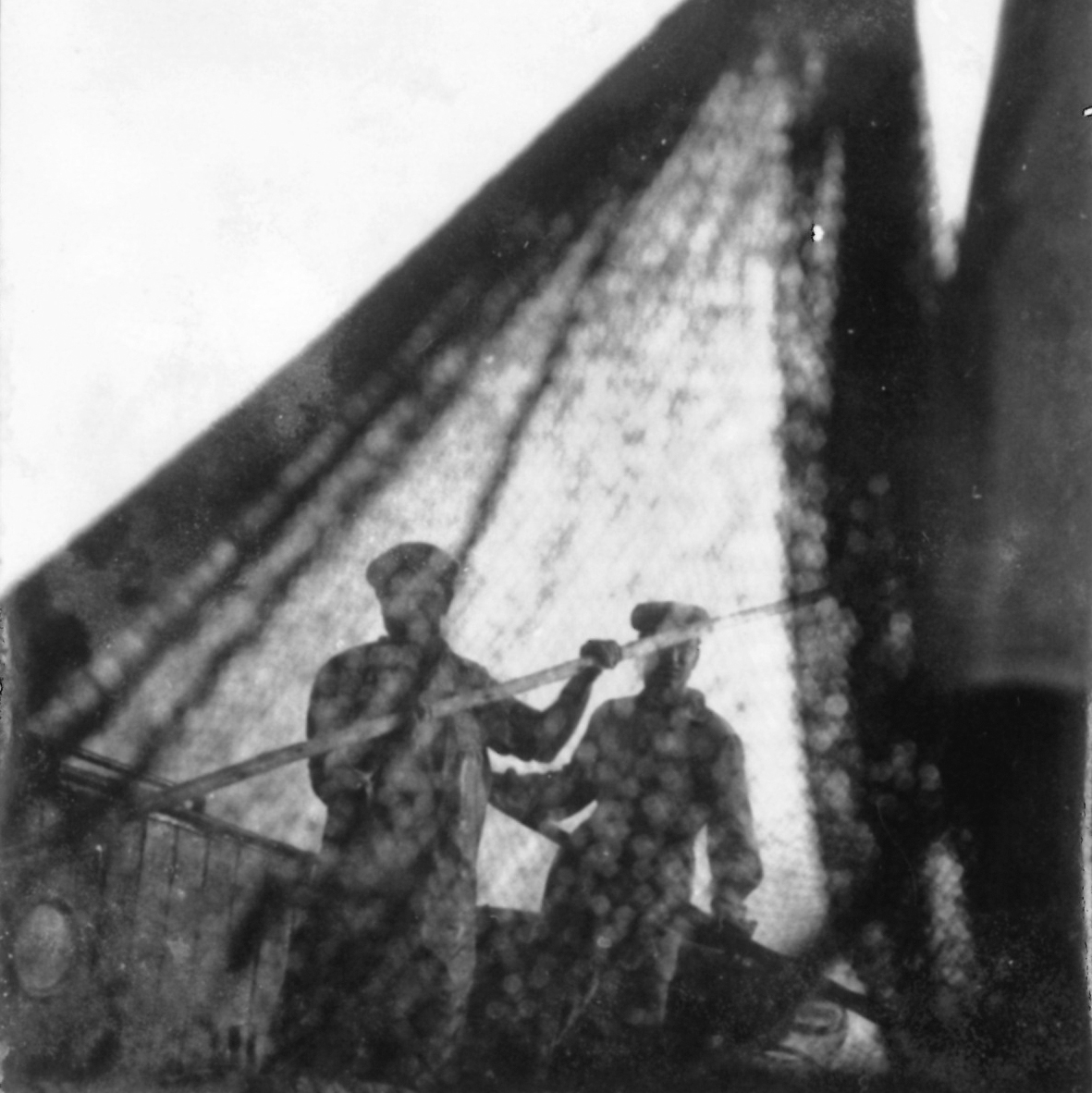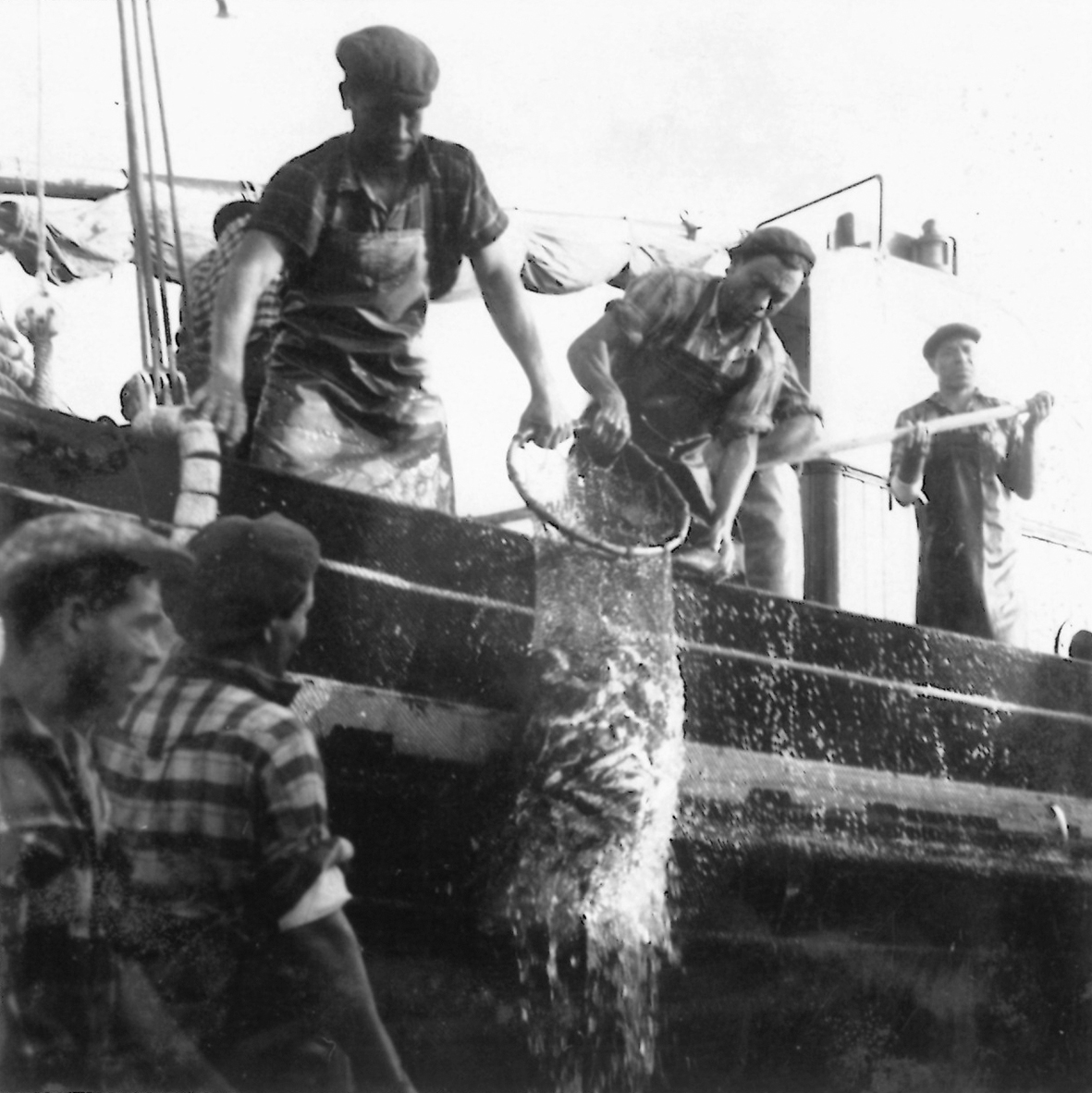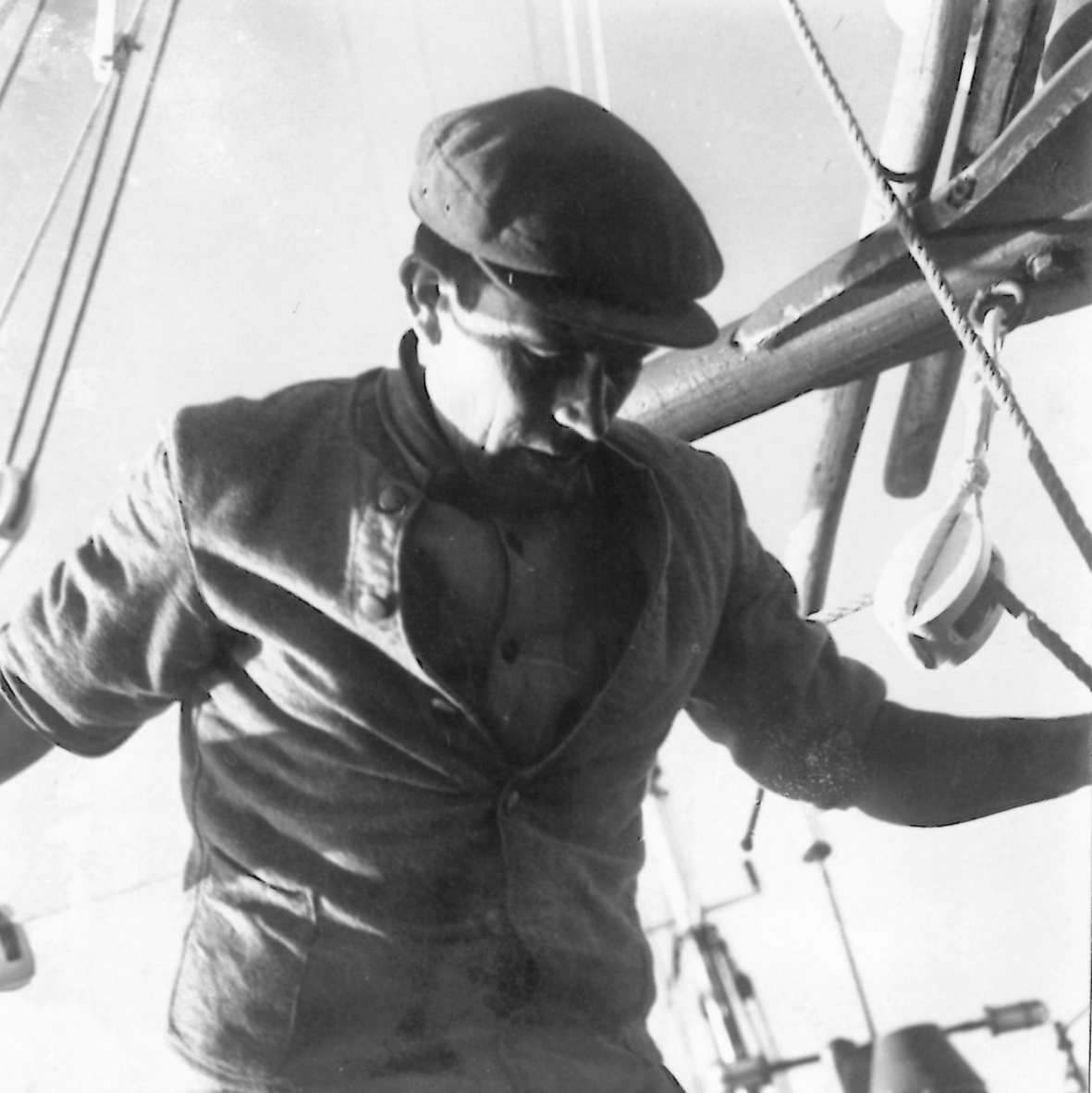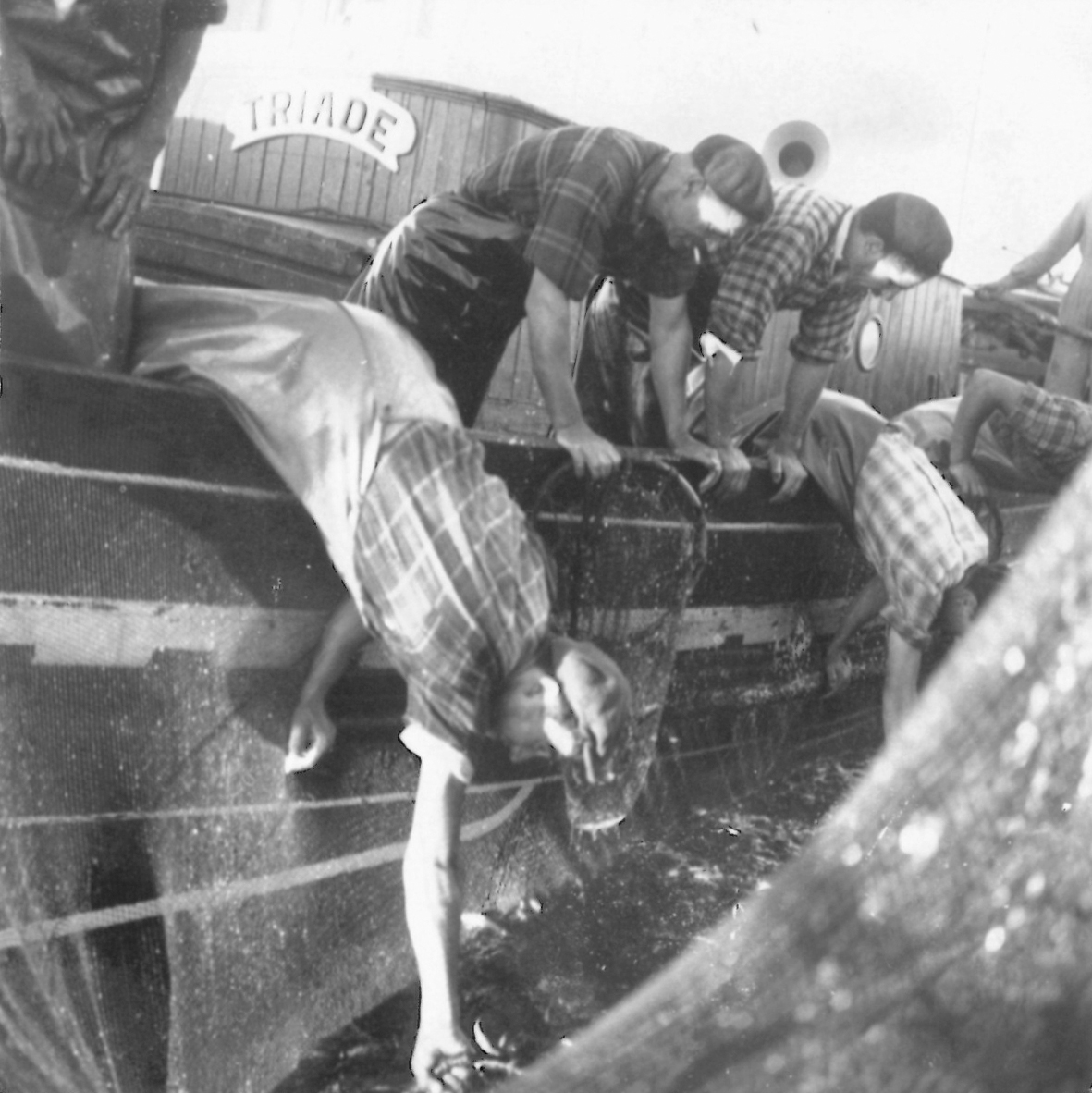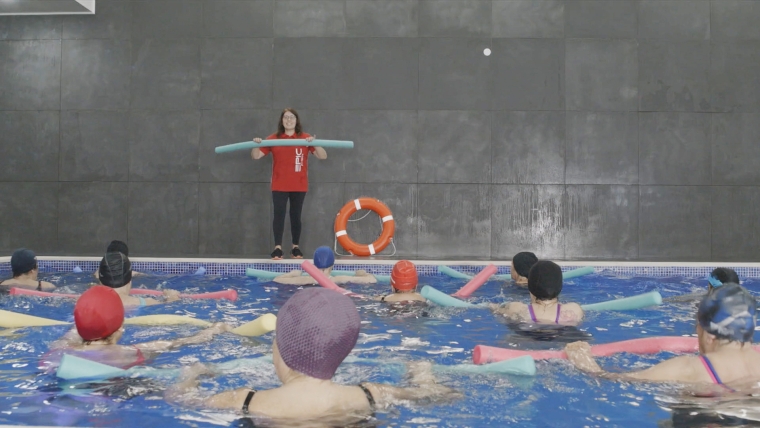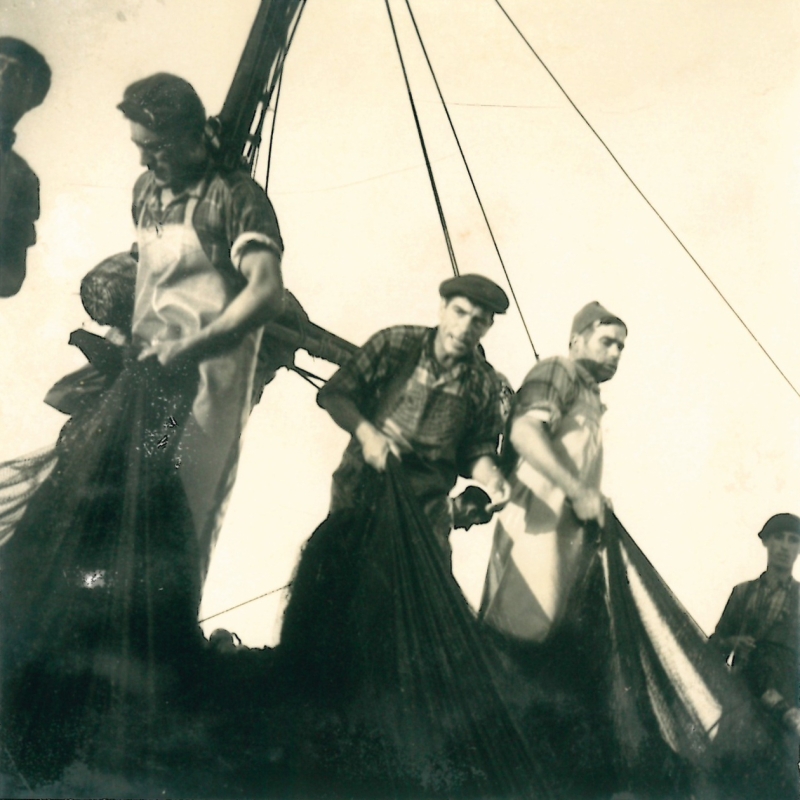The Algarve beyond the fishing nets
Two sons of fishermen who escaped through the mesh of the nets give their views
Presented in the context of Leva-leva: Litany of Portuguese Fishermen, a project by FLEE
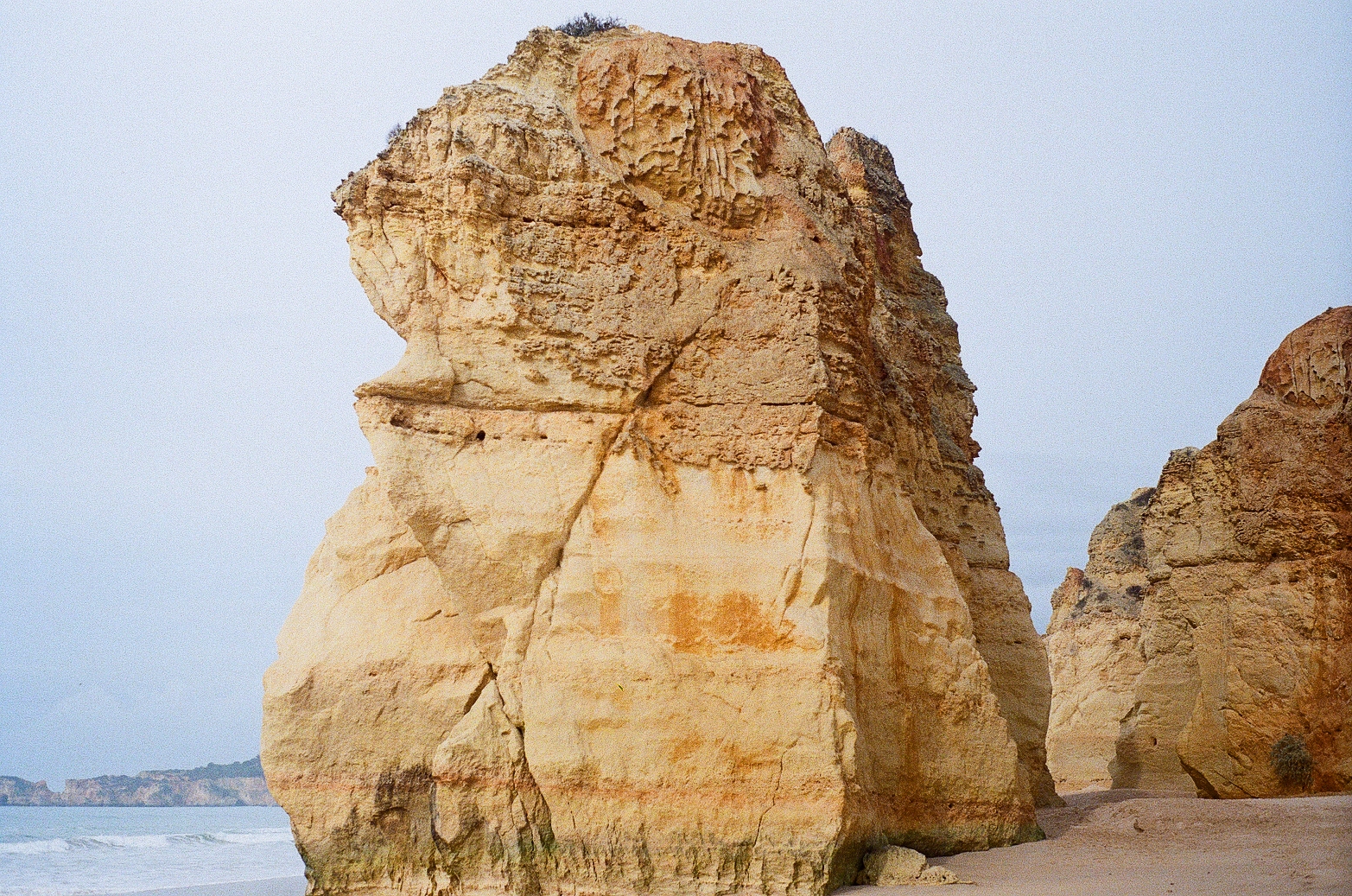
Rock on the beach, Praia da Rocha, Portimão. Photo: Tessa De Baudinière.
Alan Marzo / FLEE
The three of us have gathered here at the Clube Naval de Portimão. José and Humberto, you both come from fishing families here in Portimão, a town that lived almost exclusively from fishing up until the 1970s, and you’ve spent most of your lives here. Can you describe the town you knew back in those days?
José Francisco Rosado Garrancho
Everything was about fishing here. Most of the men were fishermen and their wives worked in the fish canning factories. Not only was the economy built around fishing, but most of the surrounding villages depended on the fishermen, who brought fish for their families and neighbours. At the time, there was the Casa dos Pescadores [Fishermen’s Association], a kind of government agency which, during the dictatorship, provided certain services to fishermen, such as access to healthcare and housing for the more disadvantaged.
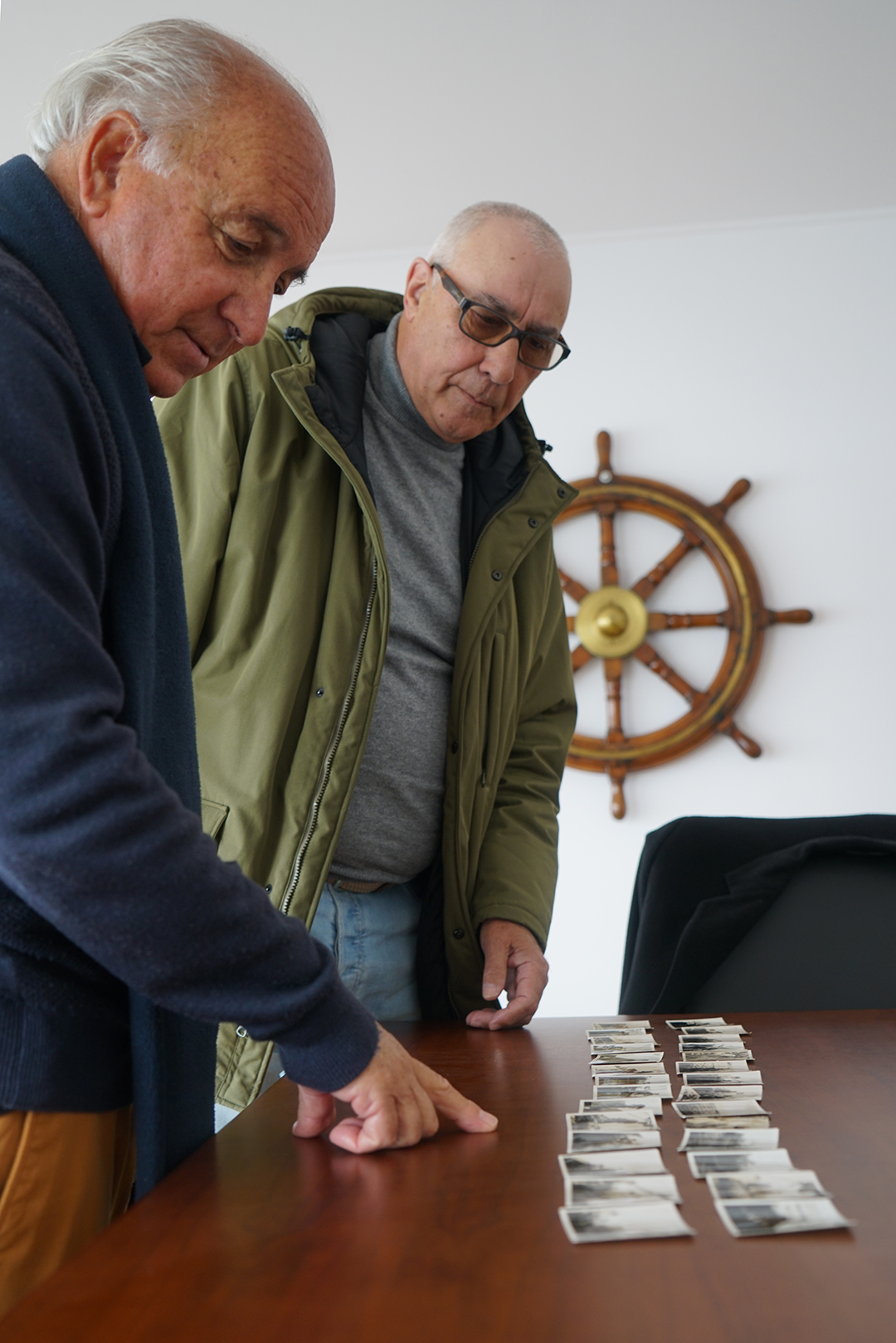
José Garrancho and Humberto Reis observing the Reis family photographic archive, Portimão. Photo: Alan Marzo.
Trawlers being repaired at the shipyard, Portimão. Photo: Tessa De Baudinière.
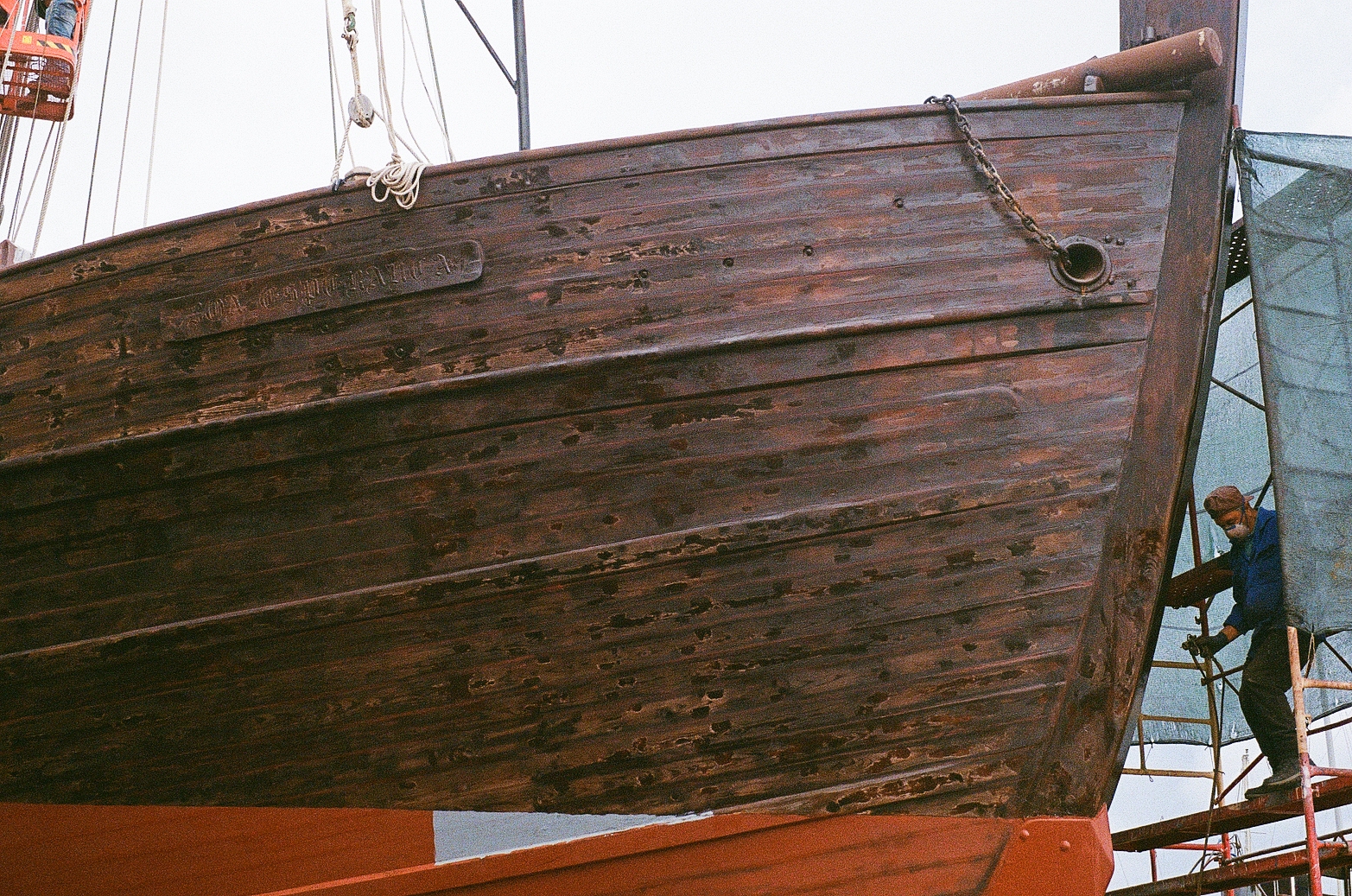
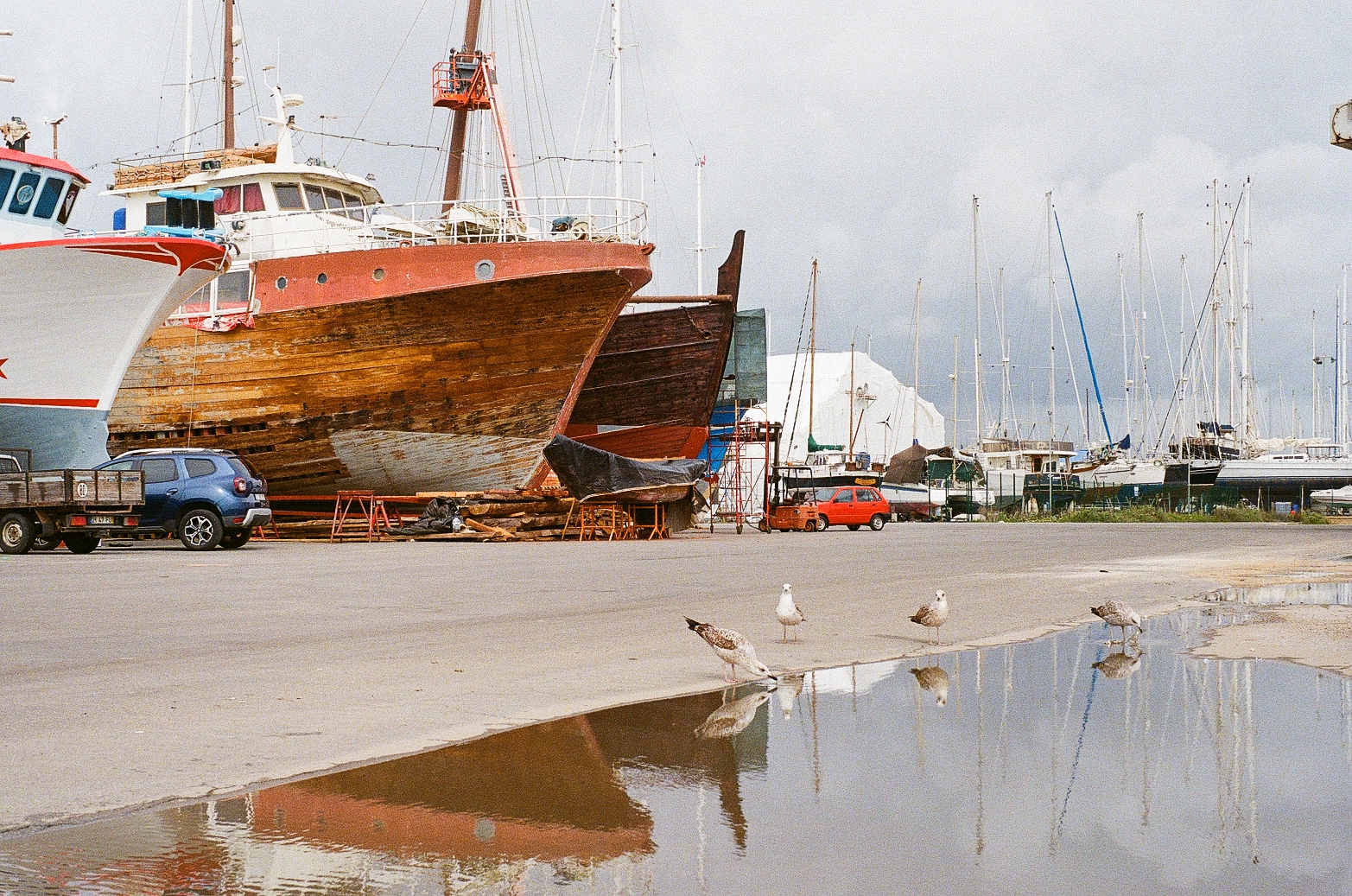
Alan Marzo / FLEE
You mentioned the fishing economy. Can you also tell us how the work was divided up at the time – both on and off the boat?
José Garrancho
I can only really speak about life on the trawlers. There was a crew of approximately 16 or 18 men, plus two or three people on land who took care of the nets (in terms of organisation and repair). On the boat, you first had the captain, who was responsible for the boat and the fishing. A navigator, working under the captain’s orders, was responsible for the navigation. Then there were those responsible for the engines: an engine officer and his assistant. There were also crew members responsible for the nets on the boat. Of these, one important figure was the mestre da aberta, whose role it was to coordinate the letting out of the nets, which were pulled by a small boat that made a circle of roughly 800 metres before returning to the main boat. There are normally rings on the lower part of the nets which make it possible to close it at the bottom. The mestre da aberta had to count the number of rings in the water, which told him the length of the net that was already underwater and how the net was closing around the fish. There were two men in the small auxiliary boat who played a very important role, as they secured part of the net during the manoeuvre and informed the crew on the main boat where the fish were.
Back in the day, each trawler was accompanied by two boats to store the fish: the enviada and the acostado. These boats were positioned behind the nets when they were pulled in so as to catch the fish. That’s all changed; these days, there’s only one. The enviadas would bring their full loads back for auction, and the amount sought for the catch would start off high and then go down until the buyer stopped the auctioneer. The trawlers were tied up at the quayside and once their load had been bought, they would take it straight to the canning factory, or elsewhere, so it could be unloaded.
As far as the workers were concerned, the women in the canning factories were paid by the hour, while the men on the boats received a percentage of the catch that was sold: 1.1% for the ordinary crew members; double that for the navigator; and 4.4% for the captain.
Humberto Reis
It’s fair to say, José, that the 4% for the captain was just a guideline figure, as often the boat owner would give him a bonus to make sure he stayed. Good captains were not easy to come by. I remember one whose nickname was “Conquilha” (clam), and he earned a bonus of almost 300,000 escudos (roughly 1,500 euros today).
José Garrancho
That was almost enough to buy two apartments around here. Captains were a little like football managers are today (laughs). However, while it is true that many were a bit envious of the captains, our parents didn’t want us to opt for that life, as it was tough and dangerous, preferring that we went to school and studied instead.
Hotel Atlântico, Portimão. Photo: Tessa De Baudinière.

Alan Marzo / FLEE
Coming into Portimão, the first thing that stands out is the huge towers along the seafront, a very brutal style of architecture and urban development that contrasts with the region’s wild beauty and reveals the impact of tourism in the area. Can you tell us about the economic transition from a fishing community to a town that lives off tourism?
José Garrancho
As you can imagine, when tourism comes to a region a lot of workers gravitate towards it. In the case of Portimão, tourism brought the hotels and they represented “clean” jobs that were seen as easier, particularly for women who were used to slave-like, hourly work in the canning factories (up to 15 hours a day at times). Suddenly the same workers were being offered salaried worker status. Of course, this led to problems in terms of mentality, because, at first, the men didn’t like the idea of their wives working in hotels where they could be seduced by other men (laughs). But they adapted... What’s more, the hotels often gave their employees food and sometimes their families too, so...
And the tourists and their lifestyles influenced us a lot too, unfortunately (laughs). We saw people having fun, going out, drinking every night, eating out. We thought they lived like that, and we should aspire to that lifestyle. We didn’t understand that those people worked all year round, and sometimes very hard, so that they could have two weeks of holidays in which they could enjoy themselves as much possible. Of course, a lot was lost when tourism arrived. For example, fishing was a very physical activity that required a lot of discipline. If you looked at fishermen back then, they always had very muscular forearms and washboard stomachs. Because they spent all day pulling the nets in rhythm to the sound of “Arribalé, arribalé”. But, today, that’s all gone – the singing, the physique and, of course, the discipline (laughs).
Alan Marzo / FLEE
On the subject of the singing, I have a question to ask you, Humberto, about the recordings made by Michel Giacometti here in the early 1960s. Your father was captain of the Nicete where the ethno-musicologist made the famous “Leva-leva” recording. Can you tell me a little more about that?
Humberto Domingos Pereira Reis
The truth is that the boat’s owner, José António Rita, didn’t feel like meeting Giacometti when he arrived, as he lived in Vila Real de Santo António. So it was his representative, Manuel Vicente, who first met him. Vicente spoke to my father, the captain, and a meeting was arranged with Giacometti who had come with his wife. That’s how they arranged for Giacometti to accompany a fishing expedition, and he proceeded to film and take photographs on board.
1. Sardine fishing on board the trawler Nicete. Photo: Michel Giacometti.
2. The transhipment from sardine to envoy. Photo: Michel Giacometti.
3. Sardine fishing, the hauling of the nets, in the trawler Nicete. Photo: Michel Giacometti.
4. Sardine fishing on board the trawler Nicete. Photo: Michel Giacometti.
5. The transhipment from sardine to envoy. Photo: Michel Giacometti.
|
1. |
2. |
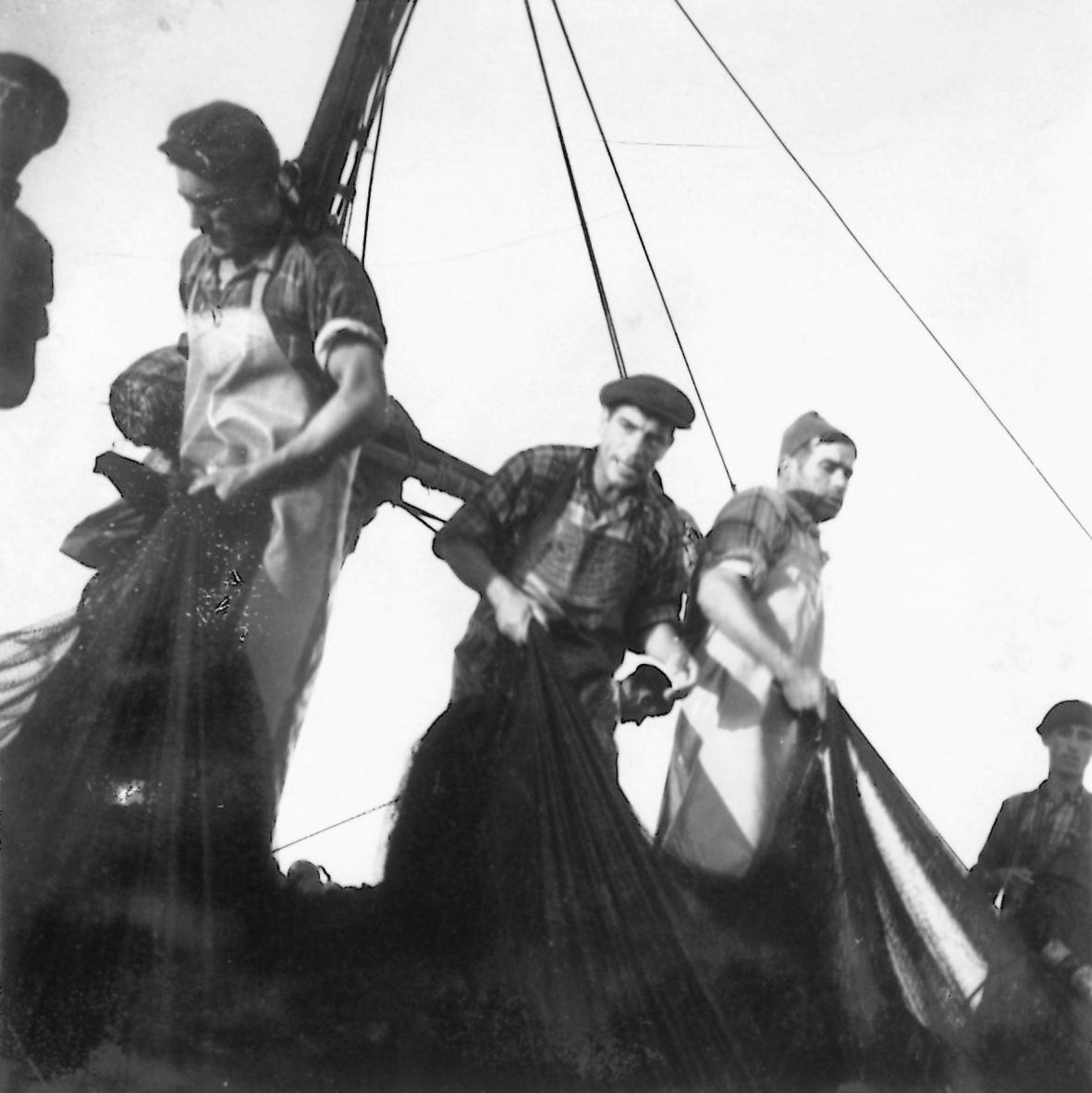
3.
|
4. |
5. |
Alan Marzo / FLEE
Do you remember any of the melodies or origins of those famous songs, José, Humberto?
José Garrancho
The men would sing here, like in many other regions of Portugal, to provide a rhythm as they worked together. On the boat, they would sing to accompany the letting out of the nets. I often went fishing with my father. At the time, people listened to the radio a lot and the music they heard also influenced their songs. Normally, on a boat, one man was the main singer and the rest of the crew responded to him in one voice. A lot also depended on the mood and the size of the catch, etc. For example, when they saw that there was a lot of fish in the nets, they were excited and the singing was faster. On bad days, the singing was slower and became more melancholic. My uncle António was the main singer on a boat, and he often sang “Arribalé, arribalé, arribalé, arribalé”.
Alan Marzo / FLEE
Ok, so I’m a bit confused… In our research, in the recordings we found by Giacometti and, before him, Armando Leça and even those from later by José Sardinha, the title “Leva-leva” is used, implying that the fishermen would say these words as they pulled on the nets. But you mention melodic singing based around the phrase “Arribalé, arribalé” (arriba, arriba + olé to add rhythm).
José Garrancho
Yes, I’ve heard about Giacometti’s song, but around here we don’t identify with that recording. In fact, I sometimes ask myself if it was really recorded on a boat in Portimão, or if Giacometti recorded it elsewhere and then used it for the film he made about the fishermen on the Nicete trawler. Around here, I’ve only ever heard “Arribalé, arribalé”.
Humberto Reis
It’s true, I’ve never heard fishermen sing that (“Leva-leva”)...
Alan Marzo / FLEE
So, the mystery continues (laughs). Just one last question: we know that, directly and indirectly, Giacometti’s research work was very political, as it documented a world of labour that was often very poor, and the Salazar regime didn’t seem to care too much about it. What was the situation amongst the fishermen like at the time, were they very political as the revolution of April 1974 approached?
José Garrancho
During the dictatorship, with the secret police and informers everywhere, no one could really be political. Activists risked being visited by the secret police at three in the morning and ending up in a political prison. In that climate of fear, anyone who was not for the regime was seen as being against it and treated as a communist. Most people came to terms with that. In fact, given the poverty, many were not interested in politics at all; what was important was putting food on the table and keeping their jobs. As far as the women were concerned, their working conditions were very bad and they were paid by the hour. When the fish arrived, at any time of the day, a siren would sound in the village and they had to go to work, at all hours of the day or night and for an unlimited time. If they were five minutes late, a full hour was taken out of their wages. And when there was no fish, they simply didn’t work and earned nothing. Despite these terrible living conditions, they never rebelled. But, as you know, the times were different...
Born in 1949, José Francisco Rosado Garrancho is a writer, researcher and photographer with a passion for the local culture and a singer of fado whenever he feels the urge. He was born into a fishing family, and his father was the captain of a trawler. After completing compulsory military service in the early 1970s, which saw him subsequently having to fight for more than two years in the former Portuguese colonies in Africa, he left for London to study hotel management. He spent four years in London, where he met his wife, with whom he returned to Portugal and settled down in the Algarve. His experience in Britain and his many talents helped him to rise quickly in the hospitality industry, as it experienced impressive growth along the Portuguese coast, finally becoming the manager of a prestigious hotel in Portimão. Alongside this career, he carried out lifelong journalistic research into various Algarve-related cultural phenomena, which he presented first and foremost in his regular contributions to the regional weekly newspaper Barlavento, with which he worked for more than 40 years. A multifaceted intellectual, he has shown great ease in working in a wide range of cultural fields, earning him the nickname of “Portimão’s Swiss army knife”.
The son of Luís dos Reis, captain of the Nicete fishing boat where the ethno-musicologist Michel Giacometti recorded his famous work songs, Humberto Domingos Pereira Reis was born in Alvor in 1948. He comes from a long line of fishermen. At the age of 11 he moved with his family to Portimão, where his father found work as a trawler captain. He completed his secondary schooling there, ultimately deciding to not follow in the seafaring steps of his ancestors. When the colonial wars began in Portuguese Africa, he was conscripted by the Portuguese Army to fight in Mozambique. He stayed in the army until 1973. When he returned, he worked for many years in the hospitality industry and then as a civil servant in Portimão. He is now retired and enjoying the beautiful landscapes of Portimão and the surrounding areas to the full.
Founded by Alan Marzo, Olivier Duport and Carl Åhnebrink, FLEE is an independent interdisciplinary publisher, record label and curatorial platform dedicated to the documentation and enhancement of hybrid cultures. Creatively exploring and emphasising the outlines of globalisation from a historical and critical perspective, FLEE focuses on shedding light on subjectively selected cultural phenomena, while interacting with contemporary artistic approaches. Looking at a range of topics and disciplines, from music to architecture, FLEE follows an inclusive work method that favours a diverse range of viewpoints.
With all the restrictions that come with a theoretical and artistic approach, Leva leva: Ladainha de pescadores sets out to pay homage to the men and women who, despite difficult living conditions, managed to create an extremely rich social, poetic and musical tradition thanks to their indisputable courage and wisdom. Viewing that culture through the lens of the chants intoned at work rapidly became a self-evident choice in the context of this project. Not because school, festive or religious songs do not reveal the true nature of a community, but because it is at, and through, work and the interaction it induced among companions that man becomes what he is meant to be and remains closer to his own soul. For, whilst it is true that the exploitation and alienation that are so often inherent to it make the life of a worker and that of the rural labourer and fisherman more difficult, it is no less true that “the work of man is always a mirror in which the conscience recognises its own reflection”.


